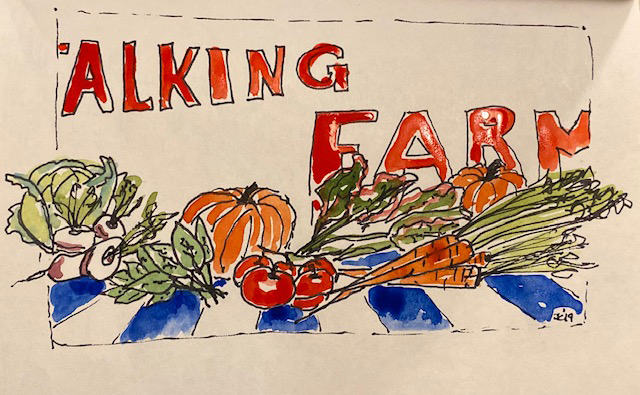
Painting by Jeanne Cunningham
A cold wet fall Saturday at the Talking Farm in Skokie, IL was a workshop day of learning for a group of 25 urban farmers and urban farmer wannabes. Our speaker was Ben Hartman, author of the The Lean Farm and The Lean Farm Guide to Growing Vegetables, who also hosts the Lean Farm School at his property in Goshen, Indiana. Ben and Rachel Hartman own Clay Bottom Farm where they are able to support a family of four with a sustainable lifestyle. Oh and importantly, their farmed area consists of less than one acre of land.
By applying lean concepts, Ben and Rachel changed their lives from a 50-60 hour workweek and the farm “owning” them to a 35 hour workweek with them owning the farm. This with more output and better quality. Ben was exposed to lean concepts from Steve Brenneman, who led his custom trailer company through a very deep and successful lean transformation. Steve has been sharing the “secrets” of his lean vision with other companies near him in northcentral Indiana. Though Steve’s experience was based in his manufacturing environment, Steve had long since realized they applied to processes everywhere. Ben was not deterred from learning the concepts that he originally thought were for manufacturing, and he began to learn and be coached by seeing the lean basic concepts of customer focus, waste, and continuous improvement in play at the trailer company. Soon with some gentle coaching from Steve during gemba walks at the farm, Ben started seeing large opportunities for improvements. And, the rest is a very successful lean transformation for Clay Bottom Farm.
As with Steve, Ben’s success spurred him to share with others and in particular, with those in the urban farming movement. Urban farming is growing because of an increasing desire to grow one’s own food and to purchase food grown locally and sustainably. Ben wrote two books and provides training sessions at the farm, and now has begun to conduct a very limited number of seminars each year to speak to others about his lean farm. On this Saturday in Skokie, he was presenting at a non-profit that provides education about growing food to a diverse set of community learners in the local schools and in social agencies. Matt Evans, the farm manager had read The Lean Farm and attended a workshop at Ben and Rachel’s property and knew providing exposure to these concepts fit perfectly with The Talking Farm’s mission.
I attended the workshop, not because I am an urban farmer (my house plot has NO sun!), but because at LEI, we want to expose and spread lean thinking and practice to all industries and workers. We know there is no reason for the concepts to not apply everywhere, but that does not mean the concepts are being used everywhere. Some industries with increasingly strong exposure to lean include manufacturing, insurance, healthcare, construction, and others.
But the very large and important food industry and the overall food value stream has only had a very small exposure to lean principles and tools. What do I mean by the food value stream? It includes agriculture (growing and processing), food distribution, preparation, and service. Food from the ground to the table. Food at home, at the picnic table, in the car, or at a restaurant. It’s all in the food value stream and includes every human on the planet. We all are impacted by the performance and quality of this value stream. And this value stream has some of the very worst jobs in terms of safety, worker respect, and overall waste. It is a value stream with very uneven sources of cash/profit as well. LEI is very interested in the food value stream, and we are watching, learning, encouraging, and helping to bring lean concepts to this essential industry.
I felt at a minimum by attending this workshop, I would be supporting LEI’s efforts. But could I also learn something about lean thinking and practice that could be brought to other industries?
I think I did.
First, Ben shared with us his perspective that the embryonic lean thinking by Toyota back in the 1930’s might actually have its roots (no pun intended) in the traditional small farming experience in Japan during a period he refers to as the “industrious” revolution. This was an era where Japanese farmers with limited land available learned to cultivate more food for many, many, more people with less process waste as well as less power via a large reduction in the number of oxen used. Ben’s thesis is that these farmer’s descendants were inspired by how the earlier farms had so dramatically improved productivity worked as adults at Toyota and sought out existing writings on productivity and applied similar waste reduction basic concepts to their looms and later to their automobile manufacturing to develop the Toyota Production System (TPS).
Next, Ben shared some compelling data about the existing changes over the past 20 years in the Midwest climate where he farms. There is already a longer growing season, more 90-degree days, and more heavy rains. Why are those facts important to the small farmer? What opportunities does it present? What changes will it require? It reminded me of the presentation by Andi Plantenberg at the Designing the Future Summit about thinking about the future as a way to help shape your current strategies. For LEI, it certainly caused me to personalize the thought of “What is the climate in which LEI exists?”, and how are we adapting to this climate.
Ben also shared how his lean focus on the customer as the only definer of value has shaped their strategy. He does not take what the customer says he wants and just strive to provide that. Ben realizes that he has constraints of what he can profitably provide the customer and focuses on meeting those precise needs in a very customized way. So, if a customer wants corn, his farm is not going to be the source. Because Ben knows that as a small-scale farmer, corn will not provide adequate production per unit of space and time available to them at their farm. However, if the customer needs 10 bunches of kale, 12 bunches of carrots with greens removed, at 12 pm on Tuesday, he can and will do that. He knows the numbers of his business that he can rely on (while working to improve on them at the same time). He only creates these measures periodically and knows he can rely on them. (And how nice of Ben to refer to Real Numbers as one of his sources of learning.)
However, my biggest learning of the day, that I think many of us can learn from, is the importance of knowing the natural laws of the field in which you are working. For Ben, it is the laws of how seeds and plants grow. A farmer is a grower. What is technically required? Lean thinkers think much about processes. But a process without technical knowledge is nothing. The process must connect with the technical knowledge (or natural laws). Here are three examples that Ben mentioned in the course of the day.
- Plant carrot seed early because it can delay germination until the right factors exist and you want the carrot to germinate before the weeds.
- To eliminate weeds, let the weed grow to about 4 inches and then cut prior to budding. Repeat several times and it drains the sugar from the weed and it dies. To avoid weeds, do not till lower that 2 inches or it brings weeds to the surface.
- Know the exact germination temperature for each type of seed and plant so that you can germinate as quickly as possible by applying proper heat level. This then reduces overall growing time.
The reason I think this was so impactful to me, is that in any industry or any function, it is important to know the real constraints whether they are technical, environmental, or legal. If these are not known, then it is like me just throwing some seeds in a pot and hoping they grow. And believe me, it is so hit or miss in terms of success. With a good understanding of the true constraints, a process can be honed to get closer and closer to the true value add of the work. Then the least possible effort can be applied to get the very best result for the customer.
And that is lean thinking and doing at its essence!
Jean
Jean Cunningham
Chairman, Lean Enterprise Institute





